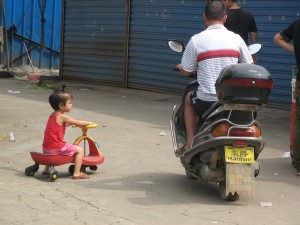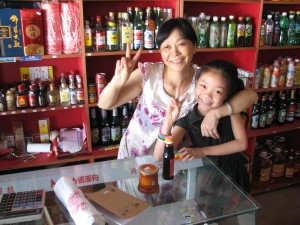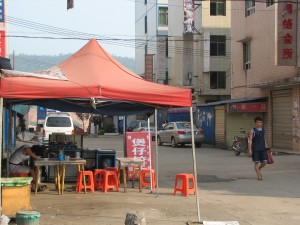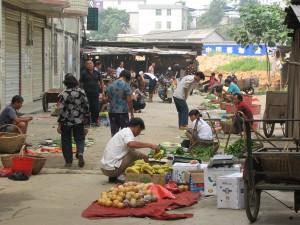Street Life
 There was a dirty two lane street just outside the gates. Construction vehicles threw up plumes of exhaust and dust as they tore up the pavement and surrounding countryside. Vehicles of all shapes and sizes sped to and fro. People rode motorcycles, cars, trucks, and tricycle-like cars. Some people seemed to have engineered their own personal motorized vehicle from remnants found in a junkyard. Meanwhile, students filtering in from summer vacation weaved their way across the street to the bus stop and the market area just opposite of the university.
There was a dirty two lane street just outside the gates. Construction vehicles threw up plumes of exhaust and dust as they tore up the pavement and surrounding countryside. Vehicles of all shapes and sizes sped to and fro. People rode motorcycles, cars, trucks, and tricycle-like cars. Some people seemed to have engineered their own personal motorized vehicle from remnants found in a junkyard. Meanwhile, students filtering in from summer vacation weaved their way across the street to the bus stop and the market area just opposite of the university.
 This “market area†resembled a two-block section of a city that just sprouted out of the stony ground. There were shops, restaurants, internet cafes, book stores, and barbers. People laid produce on blankets in the back alleys. In one stall, a boy sat with his head down on his arms mindlessly waving a flyswatter through an insect cloud that hung over a wooden board of chicken carcasses. A woman sat by white tiled tubs of crystal clear water and charcoal grey catfish. In yet another stall, a woman kept roosters in a neat stack of cages.
This “market area†resembled a two-block section of a city that just sprouted out of the stony ground. There were shops, restaurants, internet cafes, book stores, and barbers. People laid produce on blankets in the back alleys. In one stall, a boy sat with his head down on his arms mindlessly waving a flyswatter through an insect cloud that hung over a wooden board of chicken carcasses. A woman sat by white tiled tubs of crystal clear water and charcoal grey catfish. In yet another stall, a woman kept roosters in a neat stack of cages.
 People grilled meat on sticks, and old toothless folks sat at tables laughing and playing mahjong and crad games. There was the smell of grilling meat, burning leaves, and the occasional whiff of something foul, yet indefinable.
People grilled meat on sticks, and old toothless folks sat at tables laughing and playing mahjong and crad games. There was the smell of grilling meat, burning leaves, and the occasional whiff of something foul, yet indefinable.
Apartments were stacked up on top of the street level shops. Laundry hung across the alley like prayer flags. People chatted, haggled, and generally ignored the cacophony of horns, cell phones, and cock-a-doodle-doos. Occasionally a brazen merchant would toss out a “Hello†as I passed their stall.
 And then there was a wasteland that stretched between my school and downtown Chenzhou. Everything was razed, bulldozed, and piled up. It seemed that developers were in a race to throw up high-end apartment complexes and shopping centers. The buildings were empty. They were all empty and had yet to be filled with stuff and people. Billboards showed picturesque maps of the final product: The perfect place to live and shop.   The outskirts of the city had become a board game called Monopoly.
And then there was a wasteland that stretched between my school and downtown Chenzhou. Everything was razed, bulldozed, and piled up. It seemed that developers were in a race to throw up high-end apartment complexes and shopping centers. The buildings were empty. They were all empty and had yet to be filled with stuff and people. Billboards showed picturesque maps of the final product: The perfect place to live and shop.   The outskirts of the city had become a board game called Monopoly.
After a half hour bus ride, you’d find yourself downtown: A chaotic hive of activity best left for tourists cleared by their cardiologists. New York City was a paragon of clockwork law and order compared to Chenzhou, where everybody—pedestrian and motorist alike—swerved and meandered around each other, seemingly either oblivious or resigned to the accidents, injuries, and death that almost happened.
People walked along the median, sidewalks, and margins. If there was space to move forward, then there was opportunity. People beeped their horns as a preemptive warning. Despite all this, there was no road rage. Women in silk dresses and high heels thought nothing of walking in front of oncoming buses. A man wearing a construction hat drove his motorcycle against traffic. Men drove motorcycles while their girlfriends sat sidesaddle elegantly behind them, chatting on cell phones.
All this went on as Sail gave an impromptu lesson on Mandarin characters and phrases like, “Are you a doctor?†and “How much does this cost?â€